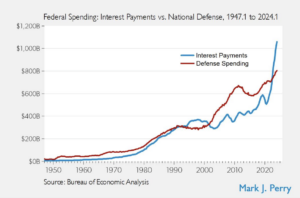Neal McCluskey has good advice for improving American higher education: “Get the Feds out.”
Gene Healy talks with Matt Taibbi about the perilous state of Americans’ First Amendment rights. (HT Dan Klein)
Arnold Kling continues to dispense wisdom. A slice:
I think that it is important to judge interventions by results, not intentions. And many American [foreign-policy] interventions have produced bad results. It is those unintended consequences that give “human rights” a bad odor in some quarters.
I would be less interventionist than Noah Smith, for the same reason that I am less enamored than he is about industrial policy. I see government as clumsy and error-prone.
Comparing government with markets, my line is “Markets fail. Use markets.” I see markets as having a more robust error-correction mechanism.
On Facebook, GMU Econ alum Mark Perry yesterday shared this alarming graph:

Bjorn Lomborg reports on “the ‘green energy’ transition that wasn’t.” A slice:
What causes us to change our relative use of energy? One study investigated 14 shifts that happened over the past five centuries, such as when farmers went from plowing fields with animals to tractors powered by fossil fuels. Invariably, the new energy source would be better or cheaper.
Solar and wind fail on both counts. They aren’t better, because unlike fossil fuels, which can produce electricity whenever we need it, they can produce energy only according to the vagaries of daylight and weather. At best they are cheaper only when the sun is shining or the wind is blowing at just the right speed. The rest of time they are expensive and mostly useless.
When we factor in the cost of four hours of storage, wind and solar energy solutions become uncompetitive with fossil fuels. Achieving a sustainable transition to solar or wind would require orders of magnitude more storage, making these options unaffordable.
Today’s progressives are blatantly unserious about governing.
Narupat Rattanakit and Iain Murray write wisely about U.S. trade policy.



